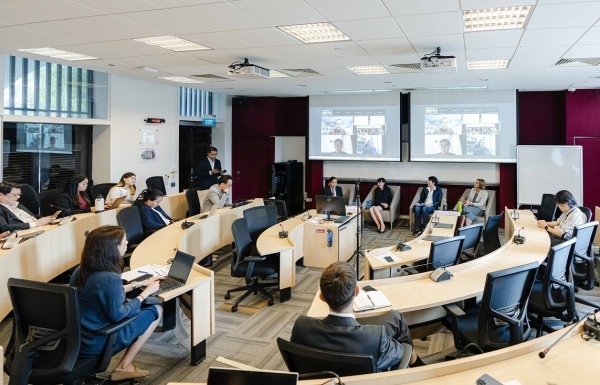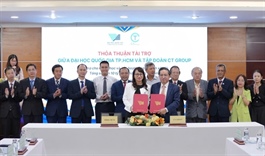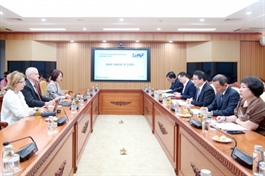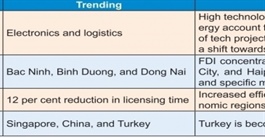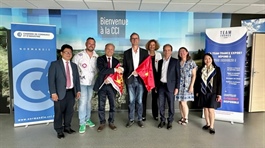Harnessing 5G and AI convergence for transformative economic growth in ASEAN
Harnessing 5G and AI convergence for transformative economic growth in ASEAN
The Lee Kuan Yew School of Public Policy (LKYSPP) has released a report outlining how ASEAN can harness 5G and AI for transformative economic growth.
The report, “Leveraging 5G to Accelerate AI-Driven Transformation in ASEAN: Imperatives, Policy Insights, and Recommendations”, provides actionable strategies to unlock the region's digital potential.
|
ASEAN faces a critical window of opportunity. The research shows 5G alone is projected to contribute $130 billion to Asia-Pacific's economy by 2030. However, adoption remains uneven across the region, ranging from 48.3 per cent penetration in Singapore to less than 1 per cent in several ASEAN member states.
Without coordinated action, these risks deepening digital divides and weakening regional competitiveness. ASEAN may get left behind as other regions accelerate their digital transformation.
"The convergence of 5G and AI represents the infrastructure of innovation, powering smart manufacturing, precision agriculture, and autonomous mobility. But ASEAN cannot afford to wait. The window for establishing regional leadership in intelligent connectivity is rapidly closing," said Professor Vu Minh Khuong from LKYSPP.
"Our report provides ASEAN with a blueprint to navigate the complex intersection of 5G and AI integration. Coordinated strategies that can accelerate regional leadership in intelligent connectivity must be established to help the region move beyond incremental improvements toward transformative digital leadership," he added.
The LKYSPP study, drawing from extensive stakeholder interviews and survey responses from over 400 professionals across eight ASEAN countries, identifies 10 critical imperatives for 5G-AI transformation, beginning with establishing coordinated digital leadership to address fragmentation that is currently slowing regional progress.
ASEAN governments should treat 5G as a strategic AI enabler, not merely a telecom upgrade, while addressing the widening skills gaps that are impeding enterprise adoption across the region.
Becky Fraser, vice president of global government affairs at Qualcomm, said that it's not just about the faster downloads that most consumers immediately associate with 5G, it really is about transforming the industry, enabling smart cities, and enhancing public services.
"5G is really connected to the most talked-about technology of the day, AI. We're seeing real benefits of 5G and AI coming together. And now we really see investments in 5G as investments in AI competitiveness," she said. “AI benefits from 5G because 5G brings with it many features.”
To secure ASEAN's digital future, the report recommends implementing five strategic priorities: establishing national 5G-AI development strategies with clear 2025-2030 roadmaps; creating empowering coordination agencies in ASEAN member countries; deploying forward-looking spectrum policies that promote accessibility and innovation.
The others are fostering vibrant AI-driven ecosystems through public-private collaboration, and implementing robust monitoring frameworks to track progress and enable course corrections.
The LKYSPP report emphasises that enterprise adoption should be prioritised as the primary driver of 5G's economic impact. Looking across the region, there is much potential and notable examples of success: Singapore's 5G-powered smart ports have achieved 50 per cent latency reduction.
Elsewhere, Thailand has deployed AI-enhanced disaster management systems, and Malaysia's wholesale network model has reached 82 per cent population coverage.
These examples illustrate the potential for transformative impacts when coordinated strategies are effectively implemented.
According to the LKYSPP report, private 5G networks are essential for Industry 4.0 transformation, while fixed wireless access offers a compelling solution for bridging connectivity gaps in underserved areas.
The report also positions current 5G deployment as critical infrastructure for the 6G evolution expected by 2030, making today's strategic decisions particularly important for future competitiveness.
Looking ahead, the study envisions ASEAN leading a 5G-AI powered future where enterprises scale globally through intelligent manufacturing, farmers optimise yields using AI-driven analytics, and students in remote areas access immersive education platforms. Realising this vision will require bold coordinated action, strategic coordination and planning, and sustained commitment to digital transformation.
- 15:59 23/07/2025


